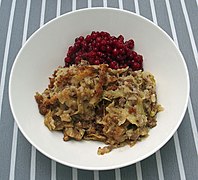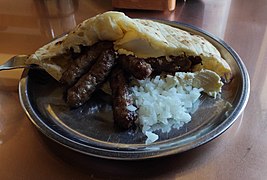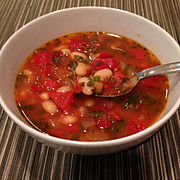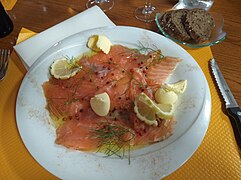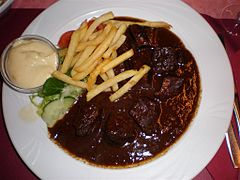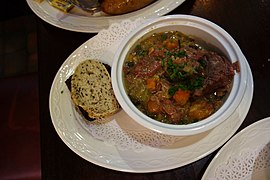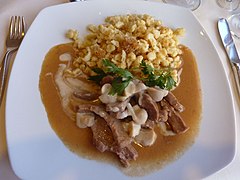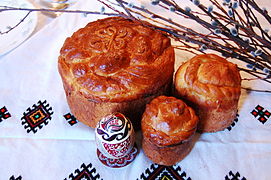Culture of Europe
The culture of Europe is diverse, and rooted in its art, architecture, traditions, cuisines, music, folklore, embroidery, film, literature, economics, philosophy and religious customs.[1]
Whilst there are a great number of perspectives that can be taken on the subject, it is impossible to form a single, all-embracing concept of European culture.[2] Nonetheless, there are core elements which are generally agreed upon as forming the cultural foundation of modern Europe.[3] One list of these elements given by K. Bochmann includes:[4]
Berting says that these points fit with "Europe's most positive realizations".[6]
The concept of European culture is arguably linked to the classical definition of the Western world. In this definition, Western culture is the set of literary, scientific, political, artistic, and philosophical principles which set it apart from other civilizations. Much of this set of traditions and knowledge is collected in the Western canon.[7] The term has come to apply to countries whose history has been strongly marked by European immigration or settlement during the 18th and 19th centuries, such as the Americas, and Australasia, and is not restricted to Europe.
The Nobel Prize laureate in Literature Thomas Stearns Eliot, in his 1948 book Notes Towards the Definition of Culture, credited the prominent Christian influence upon the European culture:[8] "It is in Christianity that our arts have developed; it is in Christianity that the laws of Europe have--until recently--been rooted."
Antoine Lumière realized, on 28 December 1895, the first projection, with the Cinematograph, in Paris.[17]
In 1897, Georges Méliès established the first cinema studio on a rooftop property in Montreuil, near Paris.
Some notable European film movements include German Expressionism, Italian neorealism, French New Wave, Polish Film School, New German Cinema, Portuguese Cinema Novo, Movida Madrileña, Czechoslovak New Wave, Dogme 95, New French Extremity, and Romanian New Wave.
The cinema of Europe has its own awards, the European Film Awards.
Main festivals : Cannes Film Festival (France), Berlin International Film Festival (Germany). The Venice Film Festival (Italy) or Mostra Internazionale d'Arte Cinematografica di Venezia, is the oldest film festival in the world. Philippe Binant realized, on 2 February 2000, the first digital cinema projection in Europe.[20]
The cuisines of European countries are diverse by themselves, although there are common characteristics that distinguish European cooking from cuisines of Asian countries and others.[44][45] Compared with traditional cooking of Asian countries, for example, meat is more prominent and substantial in serving-size. Dairy products are often utilized in the cooking process. Wheat-flour bread has long been the most common source of starch in this cuisine, along with pasta, dumplings, and pastries, although the potato has become a major starch plant in the diet of Europeans and their diaspora since the European colonization of the Americas.




![Sir Alfred Hitchcock[18]](http://upload.wikimedia.org/wikipedia/commons/thumb/9/94/Hitchcock%2C_Alfred_02.jpg/149px-Hitchcock%2C_Alfred_02.jpg)
![Entrance to Cinecittà in Rome, Italy, the largest film studio in Europe[19]](http://upload.wikimedia.org/wikipedia/commons/thumb/6/6e/Ingressostorico_cinecitta.jpg/270px-Ingressostorico_cinecitta.jpg)



